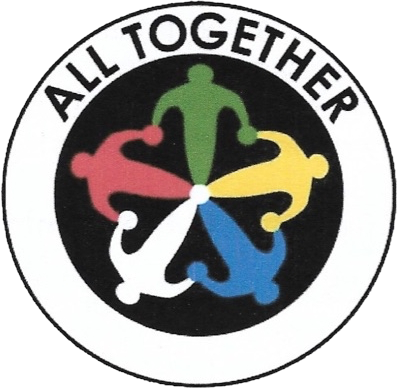All Together board members Shari Wiltshire and Eileen O’Brien led the community through two virtual discussions hosted on Zoom on May 28 and June 17.
ATW responded to the needs of their members at a time of heightened emotions given the recent murders of Ahmad Aubrey in February, Breonna Taylor in March and George Floyd in May. These three were unarmed and killed by law enforcers. Worldwide protests ensued, continuing even today, to call an end to police brutality and the over-funding of police departments.
Members who registered to attend the Zoom discussion received two articles to review to give the discussion shape and context.
One article, Skin Deep by Elizabeth Kolbert, was printed in National Geographic Magazine and introduced readers to Dr. Samuel Morton, “…one of America’s most prominent scientists [and] the father of scientific racism.”
Morton studied people’s skulls. Using these skulls, he divided people into five races and believed that these races were hierarchical as they represented “separate acts of creation.” The article goes on to debunk Morton’s theories providing evidence that “all people alive today are African;” i.e., they are of African-decent having all migrated from that continent. The fact of the matter is: Humans are closely related and one’s skin tone is only a superficial determinant of one’s differences.
Board members Shari and Eileen asked participants to offer their definitions of race.
People shared that they understood race as cultural differences. Others said race could be defined by one’s bone structure or hair texture. One gentleman shared his perspective as an employee responsible for national data collection and said race is too difficult to determine as it doesn’t provide enough categories for people to place themselves in. He prefers to reference a person’s ethnicity.
It was agreed by all that race has been used in American history to the detriment of humanity. “Race as a dichotomy can shelter us,” another participant said. “Morton’s ideas are lingering in the back of people’s minds.”
The discussion led to two more pertinent questions: Do American people privilege color over other human descriptors? Why is colorblindness seen as a simplification to the race issue?
Shari and Eileen then led the group through a discussion on a Time Magazine article: I was Pregnant and in Crisis: All the Doctors and Nurses Saw Was an Incompetent Black Woman. In that article, Tressie McMillian Cottom a professor at VCU, wrote about losing her baby after being disregarded by health professionals when she reported pain during pregnancy. Cottom explained that she did what she thought she needed to do in her life to be competent – earning degrees and working in professional spaces – yet was seen as incompetent by medical staff in her efforts to carry and give birth to a healthy baby.
This article sparked a fire within participants and quickly a discussion on what can be done to change race relations in Greater Williamsburg and the Northern Neck (one participant lives in Gloucester County) began.
Participants agreed that change begins with youth in school and encouraged one another to advocate for school budgets and the funding of equitable opportunities for youth in need. It was brought to the groups attention that Matthew Whaley Elementary School has the highest rate of use for their free lunch program as well as the highest homeless student rates.
Of course, everyone was reminded to vote as exercising that right during local and federal elections can help put the most trusted officials in office.
ATW intends to host additional virtual discussions as they honor social distancing to avoid a surge in positive COVID-19 cases. Stay tuned-in to the Events Page for more, and in the meanwhile, share your comments below.

